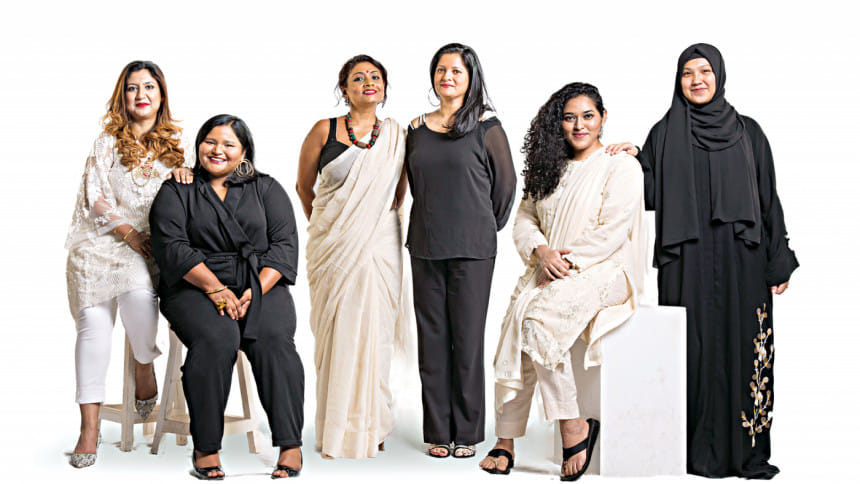The eternal juggle of work and family during pandemic

"For a working mother to be able to successfully blend and balance work and family lives, the key ingredients are planning, planning, and planning. Even during normal times, this involved setting out a basic routine for myself and the kids for weekdays, and even weekends," said Nadia Tabassum, regional manager at Unilever Bangladesh, and mother of three boys aged 11, 7, and 3. "I thrive on routine and for me, a single unplanned day can truly create havoc!"
So, one of the biggest hurdles that working mothers like Tabassum faced, especially in the early days of the pandemic, was the complete meltdown of all established routines.
Career women have always shouldered a heavy burden of responsibilities and social expectations, long before COVID-19 was a thing. A working woman was already juggling work, family, and life, but at the onset of the pandemic, their responsibilities suddenly increased. Overnight, a working mother became a teacher and a childcare provider, duties that she could otherwise relegate to schools, grandparents, and nannies during her office hours. In Bangladesh, many families let go of their part-time domestic helpers during this pandemic to contain the spread of the coronavirus. For many working mothers, therefore, this meant cooking for the family and doing the household chores, too.
"In Bangladesh, mothers are expected to shoulder the entire responsibility for child rearing. This invisible burden leaves the mothers drained," said Vidita Gazi, a communications specialist at a development agency. Gazi believes that family and society should be more sensitive towards mothers that are teleworking, during this pandemic.
"Managing both work and family during this lockdown is taking a toll on the physical and mental health of working mothers," she added. "A neglected mother means a neglected child, so we must take care of our mothers first."
With workplaces, schools, and day-care centres closed, Bangladeshi expatriates, especially working mothers, living around the world are also finding it difficult to balance career and family. The stories of their struggles sound similar to the struggles that are being experienced by working mothers living in Bangladesh.
"It gets quite difficult to focus on my work when there are two kids at home who want and need constant attention. My 13-year-old daughter keeps asking me to help her with her home-school assignments, and my four-year-old son wants me to play with him all the time," said Dr Haseen Cherry, a British-Bangladeshi microbiologist, who lives in Ipswich, England. "The lockdown has meant additional household and childcare responsibilities for me."
Then there are productivity pitfalls, too. "I have experienced loss of work productivity during this lockdown," said Reema Akhter, a Bangladeshi Australian, who is a human resources specialist in Sydney.
Akhter has two children, aged nine and two. "On top of cooking and doing essential household chores during the day, I have to look after my two children, especially my toddler, who needs a lot of care and attention. All this makes it difficult for me to concentrate on my office work," she said.
Akhter says she finishes her office work late at night, when both kids are asleep, so this pandemic has also meant working longer hours for many mothers. "There are days when I fall asleep with the laptop in my bed," she said.
"At home, we now work in chaotic and unsuitable work spaces, which results in falling work productivity," she added.
There are many working mothers out there who are finding it exceptionally challenging to keep a work-life balance during this lockdown, because not all workplaces are equally accommodating.
"My employer thinks that I do not need a lunch break anymore, just because I am working from home," said Vidita Gazi. "I need a lunch break now more than ever, because I have a husband and two kids at home, who expect me to be at the dining table with them."
Others like Samreen Abid, who is a mother of a 9-month-old infant and works at a private financial institution in Dhaka, goes to work five days a week, because her company does not have a work-from-home system in place. "I am always worried about my safety, the safety of my child, and other members of my family," she said.
For single mothers, the situation is even more difficult, as often, they are the sole primary caregivers of the children.
Jafrin Sabrina is a single mother and a lecturer at a private university in Dhaka. "In addition to adjusting to a new kind of instruction method at work that is online teaching, I am also home-schooling my 9-year-old son, who now needs more attention with his school work. Then, I also have to make sure that my house is running smoothly," Sabrina said.
"The COVID-19 pandemic is taking a toll on everyone, but for women like me, who have no intimate partners to share the struggles around this unprecedented situation, it has been particularly challenging," she added.
However, most working mothers we interviewed are happy about certain results of the lockdown, and are actively looking for coping mechanisms as well.
"To stay mentally active, I have been doing a lot of online learning and reading. There are some fantastic courses available on different platforms like Degreed and LinkedIn, which my employer has made available to its employees," said Nadia Tabassum.
Tabassum also said that she has used this lockdown to work on her cooking and baking skills.
Like Tabassum, Jafrin Sabrina also spends her leisure reading. "Rising Strong by Brené Brown and The Power of Now by Eckhart Tolle have had profound motivational effects on me during this pandemic," she said.
Our working mothers said that in spite of the tremendous amounts of stress that they are experiencing every day, they are enjoying their family time, something that they seldom enjoyed when they worked out of home and the kids went to school.
"My husband and I now sit down and discuss a wide array of subjects, something that we never did in the last 10 years," said Vidita Gazi. "The lockdown has also made it possible for me to spend more time in the company of my husband and children."
Reema Akhter also thinks that if there has been any positive effect of this pandemic, then it must be that it has allowed families to come closer. "My two-year-old son has never seen both of his parents at home 24/7. To him, it is a fun and wonderful thing that he can get to see his parents whenever he wants!"
Trying to juggle work and family in a pandemic situation is more than just stressful, but our career women are finding creative ways to cope with their stress; they are re-defining what a productive day should look like; and they are using the current situation to their advantage by connecting with their loved ones on a deeper level.
Photo: LS Archive/ Sazzad Ibne Sayed

 For all latest news, follow The Daily Star's Google News channel.
For all latest news, follow The Daily Star's Google News channel. 



Comments